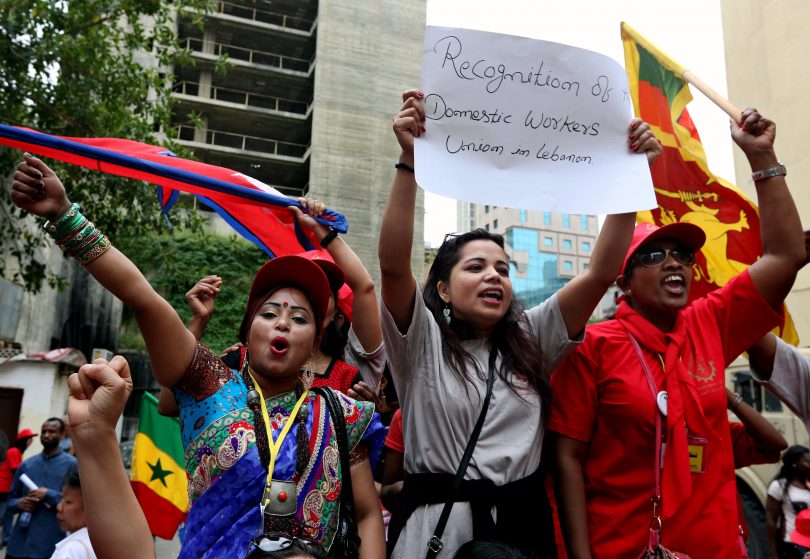This article originally appeared on the Women & Girls Hub of News Deeply, and you can find the original here. For important news about issues that affect women and girls in the developing world, you can sign up to the Women & Girls Hub email list.
By Jan Powell
As demand for home help increases around the world, the number of countries adopting laws to protect domestic workers continues to grow. But their abuse and exploitation won’t stop without a fundamental change in social attitudes, say advocates.
When Pavitra left her family and four children in Nepal to go to Oman as a domestic worker, she had high hopes that the job would provide the money her family needed for medical bills. Her sisters had gone abroad before and returned safely with a modest income. But Pavitra’s experience was different. “I would wake at six in the morning and I’d go to sleep at 1 or 2 in the morning,” she says, through a translator. “For breakfast, we had bread and tea and then at four in the afternoon we’d get one meal.”
Then one night, the husband came into the room she was cleaning, shut the door and raped her, threatening to shoot her if she told his wife. Pavitra did tell her employer, who refused to believe her and instead took her to the police, accusing her of seducing her husband. Pavitra was locked up for three months, without access to a lawyer, before she was finally sent back to Nepal. She did not go back to her family, fearing blame and stigma. “If my family, especially my husband, finds out, they will abandon me,” she says.
At least 67 million people worldwide are employed in the home – cooking, cleaning, caring for the very young and the very old. The vast majority of these domestic workers are women who, isolated and hidden away in private homes, are vulnerable to abuse and exploitation. According to the Geneva-based International Labour Organization (ILO), around 90 percent of domestic workers lack even the most basic protection afforded to most factory or office workers.
It was to try to improve conditions for domestic workers that the ILO’s Convention on Domestic Workers was adopted in 2011, setting global standards and conditions for the employment of home help. Five years on, 70 countries have taken action on Convention 189, as it is known, with 22 ratifying it, 30 adopting it and a number of others upgrading their own national legislation in line with the convention’s recommendations. But have the laws made any difference to the lives of domestic workers on the ground?
According to Claire Hobden, ILO technical specialist on vulnerable workers and domestic work, who was involved in drafting the convention, it has done some good. The convention has raised awareness of the rights of domestic workers, she says, and has encouraged the creation of many more grassroots organizations to fight for those rights and contribute to law and policy development. In 2012, Uruguay became the first country to ratify Convention 189 and now has some of the most advanced legislation in the world to protect its estimated 120,000 domestic workers. This has led to wage rises, compensation for night work, and paid holidays. A government-led, country-wide campaign has also contributed to an increase in social security coverage for domestic workers. “The percentage of domestic workers registered for social security increased very significantly following the interventions of the government,” says Hobden.
Hobden says the convention has also prompted some countries to modify their own laws to raise standards. Morocco – which voted to adopt the convention but hasn’t yet ratified it – is one of the latest countries to bring in new legislation to protect domestic workers, setting 18 as the minimum age for employment, requiring a contract of work and a minimum of one day off each week, and imposing financial penalties on employers who break the law.
But there are still many countries – particularly in regions such as the Middle East, the Far East and parts of Asia – where domestic work is largely excluded from national laws. And even where relevant legislation does exist, such as anti-trafficking laws, it is often poorly enforced.
In what Marzena Zukowska, spokeswoman for the U.S.-based National Domestic Workers Alliance, describes as a “two-fold care crisis,” shifting employment patterns, with more mothers choosing to go to work, and an aging population mean the demand for domestic services is increasing worldwide. Many domestic workers live in abysmal, humiliating conditions. Frequently dependent on their employers for food and housing, domestic workers’ meals can consist of leftovers and their living quarters limited to cramped rooms at the back of the house.
Migrants, who make up around 17 percent of domestic workers, are particularly vulnerable. In some areas – including the United States, the Middle East and parts of Europe – migrant workers who have complained about their living conditions have lost their jobs, had their visas withdrawn and ended up in prison for being in the country illegally, according to Hobden. “I remember one woman in the U.S. who had her passport and her shoes taken away from her to prevent her leaving the house – this can happen almost anywhere,” she says.
Abuse, too, is common, with domestic workers describing a range of psychological and physical violence – from verbal abuse to beatings, sexual harassment and rape – usually happening behind closed doors and rarely reported.
While strong, effective legislation is an essential tool for change, improving the lives of domestic workers requires a fundamental evolution in the attitudes of those who employ them, say activists. “Too many people don’t see ‘housework’ as real work. They believe that providing food and accommodation is adequate payment,” says Hobden.
Work in the home traditionally goes unpaid in many cultures, or in return for food and lodging. This “master-servant” relationship, which activists say is just a modern version of slavery, is widely accepted in countries where the notion of an employment relationship with labor rights is relatively new.
“You hear about the murders, the scalding by boiling water, the severe beatings, but that sets a very low bar,” says Hobden. “Other employers may think, ‘I’m a good employer because I don’t beat my help.’ But that’s not enough.” For Convention 189 to do its job properly, activists, rights groups and governments need to focus on changing the way both employers and workers think about domestic work. “We need to raise the bar,” says Hobden. “We need to change that social norm.”



